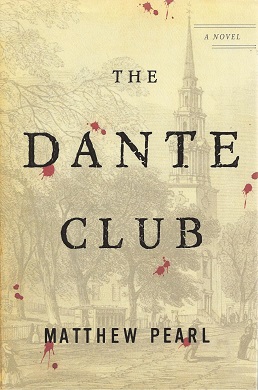In highschool I read The Inferno, okay skimmed and spark noted, so I was mildly familiar with the work which helped my reading. But Pearl does a good job in providing enough for a reader to not be familiar with Dante and still enjoy the book.
I have to say, it was a little bit of a slow start (at least after the book begins with the discovery of the first murder victim). But once we get to more people being killed, the intrigue, horror and mystery really pick up and the book takes off.
It was interesting to read about a time (1865- post Civil War) when Dante was unknown to America. Though I'm not necessarily familiar with his works, I've always felt a certain amount of reverence for it, like I do other classical authors (like Shakespeare and others). So when reading about some characters talking about Dante and his 'smut' and how Italian is not a superior language worth knowing, I was thrown. There was a time in literary history when Dante was not thought of as an accomplished and admired poet? And more significantly, the Harvard fellows at the time believed the vernacular languages to be greatly inferior to Latin, Greek and Hebrew. They thought, what could be written in these languages of any significance? Now, hardly anyone uses these languages with frequency. They are no longer revered and held above vernacular tongues as superior ways of speaking, writing, and thinking. I found all of this fascinating. It's like they thought English was just some passing phase.
Aside from the interesting historical aspects, this book is pretty solid: well-written, interesting characters, thrilling plot. I would say though, that it's not a quick read. The language (and perhaps smallish print) is very literary and intelligent and not something that you just fly through. Not that this is a problem, but stylistically important and in keeping with the characters and subject matter.
About the characters, I only knew Longfellow by name, but it was interesting to pretend to get into the lives of well-known poets and a publisher. I thought it was funny though, how the three poets (except Fields, who is their publisher) are not really on equal terms. Longfellow is revered by Lowell and Holmes, not to mention the rest of Boston. Everyone recognized him where he went; it was like he was a celebrity. (Which sort of made me laugh, because I could not recognize any famous poet if I saw one today.) I guess if I was friends with Longfellow, I might be a little intimidated and respect his mad poetry skills, but I'm kinda glad that our group of writers doesn't have a dynamic like that. None of us is thought to be better or superior than the rest. We all have different strengths as writers, but no one is on a pedestal, and out main focus is supporting each other. Though

That sounds like an interesting book! Sometimes I really like lengthy and intellectual books that you can't just power through. I haven't had any books of that caliber with me, but hopefully soon. :) I do like historical fiction like that! I will keep that on my reading list :3
ReplyDelete